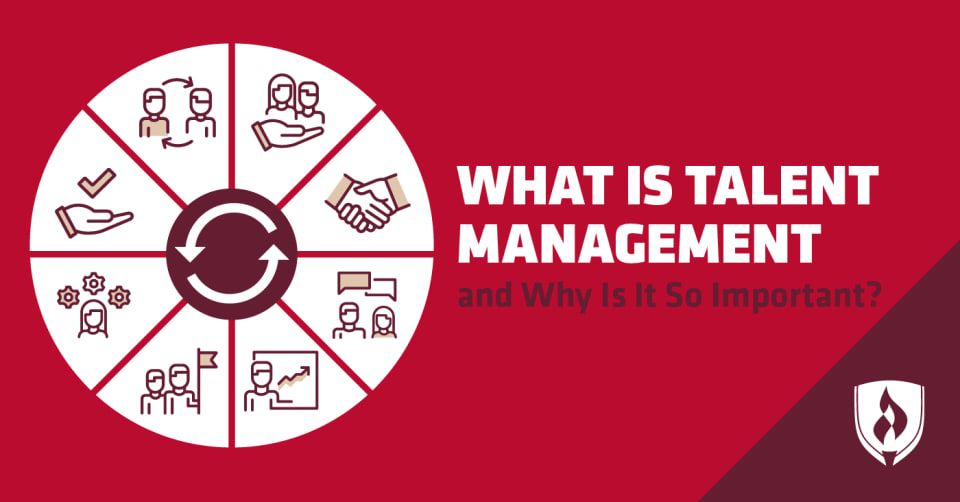
You enjoy your work in human resources, thanks to your knack for resolving conflict and your genuine interest in helping others reach their potential. You’ve mastered the basics of HR after gaining experience working in areas like payroll and benefits. Now a new area of the field has caught your eye: talent management.
What is talent management? “Talent management is the strategic deployment of HR resources to help reach business goals, specifically by hiring, developing and retaining the best employees in the market for a specific industry,” says Alex Robinson, HR and hiring manager at Team Building Hero.
This facet of HR management may seem simple, but there’s more to talent management than meets the eye. Join us in learning the ins and outs of talent management and why it’s essential to the health of an organization. Read more about employee tenure trends.
What is talent management?
You might think talent management is about finding the best person to fill a job opening, but it goes much deeper than that. “It actually touches the entire employee life cycle,” says Tim Toterhi, a chief human resources officer and the founder of Plotline Leadership.
After searching for and hiring the right person for the job, talent management focuses on onboarding and training, reviewing their performance and determining their advancement opportunities. “Finally, it requires thoughtful, long-term talent review, development and success-planning processes to drive retention,” Toterhi says.
The HR professionals responsible for talent management aren’t just looking at individual job openings. “It starts with understanding what the business is trying to accomplish and understanding how your people plan aligns with accomplishing those results,” says Jackie Dube, VP of talent optimization at The Predictive Index.
Talent management is no simple task; it requires strategic thinking to be successful. It’s this vision for the future that makes talent management an irreplaceable part of most organizations.
The undeniable importance of talent management
Talent management is an integral part of a healthy organization on many levels. Competition is fierce in today’s corporate world, with many HR professionals agreeing that there’s an ongoing “war for talent” —many open positions with not enough high-quality candidates to fill them. “We are in a tight job market, which means hiring can be a long, expensive process that may not yield results,” Robinson says.
“With the current war on talent, if you want to attract and retain top performers, you have to get the talent management piece right,” Dube says. “People are your largest asset and what will make you successful. If you’re not leveraging your people properly, if you don’t have a people strategy that aligns with your business strategy, you’re leaving your business results up to chance.”
Talent management also works to keep current employees and advance them to higher positions in the organization. This saves money that could otherwise be lost to high employee turnover. “It makes much more sense to develop and retain key talent than source, hire and train new ones. These dynamics make the HR work vital,” Toterhi says.
Successful talent management strategies
There are several strategies HR managers use to attract and retain the best employees. Dube advises starting by evaluating your organization’s current workforce, pinpointing employees with leadership potential and identifying gaps that need to be filled with new hires.
Seeking out new employees can begin once this strategy is in place. “For recruiting, tasks include head-hunting for top talent as well as developing an incentive program for employee referrals,” Robinson says.
The next step is to retain those employees, keeping them happy and engaged. The Society for Human Resource Management recommends that organizations think of their employees as investments: “They understand that employees will do their best work when they know their company is investing in them and their future.”
Robinson echoes this, saying, “A specific example of this work is shaping an employee’s career path and investing in relevant training, which contribute to both developing and retaining that employee.”
Like many business strategies, talent management requires “an intentional approach,” Dube says. She adds that developing a good company culture and understanding what motivates your employees can make them happier with their career at your organization. “This will ensure your employees are engaged and productive, which will boost retention.”
Who is responsible for talent management?
Talent management typically begins in the HR department, but leaders across the organization need to be on board if they want their initiatives to be successful. Toterhi notes that though HR management is ultimately accountable for talent management, employees working in areas such as staffing, compensation and leadership development also have responsibilities. “Nontraditional areas also play a key role, like workforce analytics, which provides the data to make fact-based decisions on talent.”
The leader of talent management initiatives typically depends on the size of the company, according to Robinson. “In small- and medium-sized companies, usually the HR manager, director of HR or recruiter is responsible for talent management.” He adds that larger organizations might include more specific job titles, like director of talent management.
Regardless of job title, Dube says that true talent management starts from the top. “Business leaders must believe and understand the value of their people and have a vision on how they are going to motivate, engage and retain them.” Only with strong leadership and vision can others in the company do their part to build a successful talent management strategy.
The right person for the job
What is talent management? This strategic HR function involves much more than meets the eye. You could be the right person for the job, thanks to your experience in HR. Learn more about HR management opportunities in this article, “13 Top Human Resources Job Skills Employers Are Seeking”




